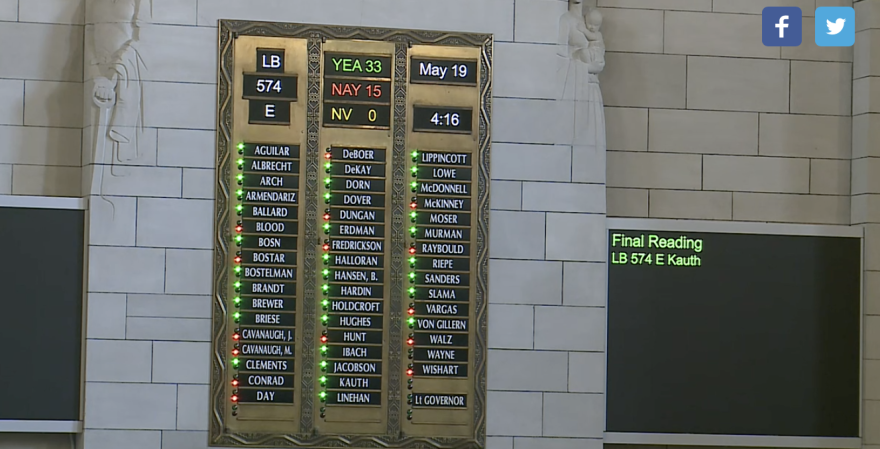UPDATE: The Nebraska Legislature has passed a bill that combines a 12-week abortion ban with restrictions on gender-affirming care for minors. Conservative lawmakers wrangled just enough votes to end a filibuster, then pass it Friday. An initial vote on Tuesday rolled the bans into one bill. Republican Gov. Jim Pillen has promised to sign it. An emergency clause attached allows the measures to take effect as soon as that happens. The bill’s passage was a blow to opponents, who strongly objected to both bans. They had believed that new abortion restrictions would not be revived this year after a proposed six-week ban failed to advance last month.
PREVIOUS STORY: Conservative Nebraska lawmakers are expected to have just enough votes to pass a bill Friday that combines a ban on gender-affirming care for minors with a 12-week abortion ban. The mood in the Nebraska Capitol since the hybrid measure was advanced Tuesday by a single vote has been volatile. Lawmakers have traded insults and promises of retribution on the legislative floor, and protesters have shown up to loudly voice their displeasure in the days after vote. The bill needs a supermajority of 33 votes Friday to end debate, after which it can be passed by a simple majority of the body’s 49 lawmakers.
A local law enforcement agent says Iowa’s new law increasing penalties for those who deal fentanyl could help curb opioid-related deaths.
The new law goes into effect on July 1.
It increases prison time and fines for those who deal fentanyl as well as those who cause serious injury or death from dealing any drug.
Cass County Sheriff Darby McLaren says the enhanced penalties offer local law enforcement agents more tools to break up drug dealing rings.
However, McLaren says it’s important that the state increases addiction treatment support as well.
Law enforcement is well-aware we're not going to arrest our, our way out of this problem. We've got to find a way to help fix the addiction. If there's demand in Iowa, the supply will be here. We've got to find a way to curb the addiction to curb the people from wanting the drug.
According to state health data, 235 Iowans died from opioid-related causes last year.
Governor Kim Reynolds signed a bill into law that’s expected to offer child care assistance to more Iowans. It raises the income limit for families to qualify and increases government payments to facilities that care for kids who get assistance.
The bill also increases the work requirement for parents who get assistance—they’ll have to work 32 hours a week instead of 28.
Iowa’s unemployment rate dropped down to 2.7% in April, compared to 2.8% in March. Iowa Workforce Development spokesperson, Jesse Dougherty, says the labor force participation rate moved up slightly, according to Radio Iowa.
The labor force added 4,300 new workers. Over the past 12 months, there was a net gain of over 26,000 jobs.
Dougherty says the participation rate and getting more people back looking for work is important. Manufacturing saw an increase of 1,400 jobs.
Amid an enrollment decline and failure to meet loan requirements, Upper Iowa University is cutting staff and planning to close some satellite campuses.
According to an Iowa Workforce Development notice posted on May 10, school administrators laid off 22 employees at the private liberal arts college's main campus in Fayette. Spokesperson Andrew Wenthe said in an email that the university will cut another 15 jobs as it closes its campuses in Illinois and Wisconsin.
The cuts are tied to the school's April 27 announcement that it would disband seven sports teams at the end of May. Upper Iowa will stop competing in men's and women's bowling, men's cross country, men's indoor and outdoor track and field, women's tennis, and shotgun sports.
Morningside University made cuts to staff this week in an effort to save on costs. The college says it’s policy to not discuss personnel issues, but impacted employees and others confirmed the news.
State officials say more than 3,000 Iowans are on track to lose their Medicaid coverage by June 1st.
During the pandemic, the state was forbidden from dis-enrolling anyone from Medicaid except in limited circumstances. That rule ended last month, which is when Iowa Health and Human Services officials started mailing out Medicaid eligibility re-determination forms.


